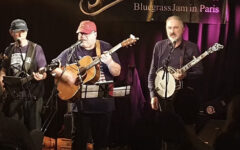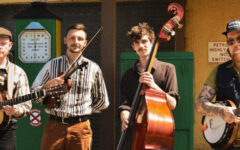
Ondra Kozák is what some folks might refer to as an overachiever. Widely heralded in his native Czech Republic as one of the country’s most accomplished musicians, he’s been the recipient of several major awards, including “The Guitar Player of the Year” prize he’s been accorded five times by the Czech Bluegrass Music Association and the four wins he’s garnered with his various ensembles (Křeni, East West, and G-runs ’n Roses) at the European Bluegrass Band competition at the annual La Roche Bluegrass Festival in La Roche-sur-Foron, France.
Nevertheless, he says the biggest thrill of his career has been the opportunity he’s had to collaborate with any number of international legends — Dan Cray, Tony Furtado, Beppe Gambetta, Dale Ann Bradley, Steve Gulley, Mike Marshall, and Cia Cherryhomes, among the many.
“It’s common for American musicians to come and play at European festivals and other gigs,” Kozák explained when asked about those musical encounters. “If they don’t bring a band, we have many great acoustic musicians who can accompany them while they’re here.”
With two solo albums to his credit — Ataman, released in 2014, and his recent effort, Overtones, which appeared late last year — Kozák has made his own qualifications clear. The latter effort finds him performing twelve instrumentals sourced from such disparate composers as Bill Monroe, composer Claude Debussy, and Kozák himself, on twelve different guitars. Melodic to a fault, it provides a rich overview of his aptitude and abilities.
In addition to his public performances, Kozák also has four instructional DVDs and various text books to his credit. He’s an ongoing presence at any number of festival workshops taking place worldwide, including those that take place in France, the Netherlands, the Czech Republic, San Diego, and Guthrie, Oklahoma. Since 2014, he’s shared his ATAmusic online workshop, an audio aid for budding bluegrass musicians. Multifaceted to a fault, he’s also an engineer and owner of his own recording studio, not to mention a budding photographer, a hobby that he allows himself to indulge whenever time allows.
“My father is a classical violinist and I began helping him ‘practice’ when I was no more than four or five,” Kozák recalls. “Both my parents love music, so they were my initial influences. My uncle is a folk guitarist, and he taught me my first chords and my first songs. Aside from that, I’d call myself self-taught. American bluegrass guitarists like David Grier, Clarence White, Russ Barenberg, Tony Rice, Kenny Smith, Jim Hurst, and many others were huge influences. I learned from them by transcribing their solos. Still, music was mostly a hobby until 2016, when my wide-ranging activities allowed me to quit my job as a chemistry researcher and make music professionally.”
In the last few years, Kozák has undertaken two short tours of the U.S. in tandem with a bluegrass band named Fragment. Not surprisingly though, much of his success has happened at home. “The Czech Republic has the biggest bluegrass community in Europe,” Kozák explains. “Some say that bluegrass music is even more popular here than in the US, at least as far as relative numbers are concerned. Some bands sing in Czech and that brings them a broader audience. I sing most of my repertoire in English which is fine for bluegrass festivals or the gigs I perform in Europe. I find that here at home, some people can really enjoy the music without understanding the lyrics, while some prefer hearing them in Czech.”
Although Kozák is known for original material, he says he especially enjoys arranging other people’s music both for solo guitar and for the bands with whom he is affiliated. “Writing seems a little too boundless,” he allows. “At this point, I find that trying to come up with an unusual cover version of someone else’s material is far more challenging and enjoyable.
In that regard, he offers ample reasons why bluegrass is so popular, not only in the Czech Republic, but indeed worldwide.
“It’s energizing and uplifting,” he maintains. “It’s natural… purely acoustic, and it’s relatively absent of gimmickry or tricks. It’s not too complicated to listen to and enjoy, yet it can be quite challenging to play and to sing correctly. It’s also very welcoming; even beginners can enjoy jamming with professionals. It brings people together and creates friendships…The community that we’re all a part of is one of the reasons for the magic that the music creates. I believe we need to keep that alive. “







